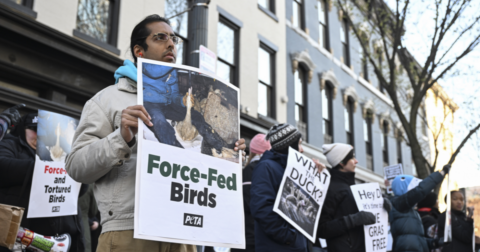News
Sentient Impact Report 2025
Policy•1 min read
Feature
Advocates persuaded 114 municipal lawmakers on Brookline to vote for the ban.


Words by Karen Fischer
Lawmakers in Brookline, Mass., a town in the greater Boston metropolitan area, voted to amend the town’s bylaws in May, to ban the sale of foie gras in both restaurants and stores. The legislative body rejected a proposal to exempt businesses that already sell the controversial food. Come November then, selling foie gras in Brookline will carry a $300 penalty. Four local institutions served or sold foie gras in the Boston suburb prior to the ban’s passage. One impacted French restaurant, La Voile, has since closed, and the ban may have been a factor, according to reporting by Brookline News.
A number of animal rights groups, including a student group, worked together to persuade a town meeting to vote for the ban. Ultimately, the ban managed to pass, 114 in favor, 79 against, with 13 abstaining from the vote.
“We’ve been working on this for months, so to see all that effort and time and energy that we spent coming to fruition is really exciting,” Ezra Kleinbaum, the president of the Brookline High School (BHS) Warriors for Animal Rights student group, told Brookline News.
In Pittsburgh, which also banned sale of foie gras, Natalie Ahwesh, Executive Director of Humane Action Pennsylvania in Pittsburgh, says there are ongoing investigations by the city into two restaurants that they believe are not in compliance, and that enforcement remains an issue there. Ahwesh also says that the group plans to direct efforts to Philadelphia next.
The proposed ban in Brookline had its critics. Christopher Mutty, executive director of the Chamber of Commerce in Brookline tells Sentient that the group will continue working for exemptions to limit the ban’s effect. Becky Mason, the general manager of Curds & Co., one of the three Brookline businesses selling foie gras once the ban passed, tells Sentient that she was approached by BHS animal rights club members trying to ban the product in town.
Mason forwarded the students an article by author and food writer J. Kenji López-Alt, which argues, among other things, that the production of foie gras is not more unethical than any other livestock product raised for meat. Mason disagrees with the ban, arguing it’s better to support sustainable farms rather than ban any particular product. According to Mason, Curds & Co. is slated to close in mid-September. Not because of the ban, she says, but its current owner is selling the business, in part due to uncertainty around tariffs and the current market.
Foie gras is currently banned or restricted in a few places in the U.S., including Pittsburgh and the state of California, and in 20 countries, including the Czech Republic, Finland, Italy, Poland and Germany. Foie gras is fattened duck liver, produced by force-feeding ducks corn or other feed through a metal or plastic tube numerous times a day. These feedings start in the last weeks of their life, and continue until they’re slaughtered. Some researchers have found that ducks are stressed when it is time for feeding. Their livers become so engorged, about 10 times their normal size, that it becomes difficult to walk.
The three retailers in Brookline must comply with the foie gras ban by November if the state attorney general approves it, or else risk random inspections that could yield a fine. Enforcement falls on local agencies. In Pittsburgh, the mayor designated community service aides to be the first line of enforcement before police involvement, for instance. These aides are unarmed workers who respond quickly to nonviolent infractions, such as parking violations, wellness checks and, apparently, foie gras infractions.
Mutty, who opposes the ban and describes it as “government overreach,” says for now the ban isn’t taken seriously by the community. “It is a punchline for many,” he says, either that or “the public is mostly unaware this happened.”
Mutty says the Chamber of Commerce is considering proposing again an amendment to grandfather in the existing business who already sell foie gras, even though the last attempt failed to garner enough support.
There have been legal challenges to similar bans elsewhere. In 2019, New York City banned foie gras, but the law was struck down by the state Supreme Court in 2024 as the court noted that the ban might put duck farmers and their business at risk. In January 2020, Hudson Valley Foie Gras farm told The New York Times that it sold about $28 million of foie gras per year with a third of the product going straight to New York City. Another farm in the region reported selling $10 million per year with a similar amount exported to the city. Humane Action Pennsylvania has set its sights on pursuing a ban on foie gras in Philadelphia. Advocates may be emboldened by the Brookline ban.
“We’re two high school students and we had an idea and we got some signatures and we brought it to town government,” high school advocate Kleinbaum told Brookline News. “And now this is law.”
Clarification: This piece has been updated to clarify Brookline as a town.